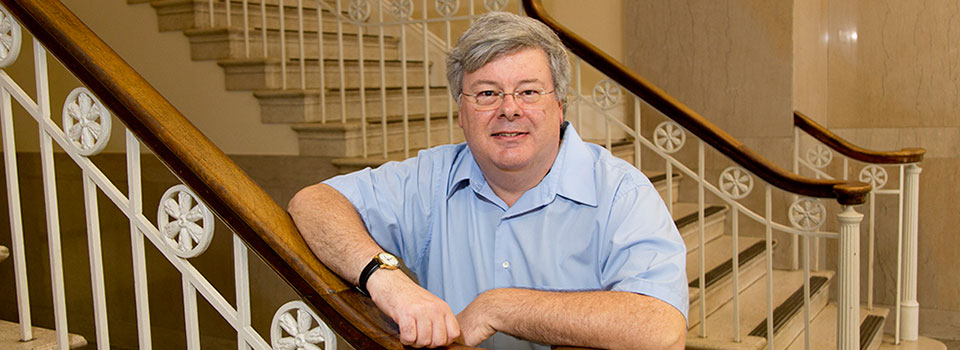John Maltese, the Albert Berry Saye Professor and head of the department of political science, says that getting students engaged in a topic and then getting them to think carefully and analytically about it makes teaching fun. Outside of the classroom, the Grammy Award winner enjoys the many opportunities to appreciate the arts on campus.
Where did you earn degrees and what are your current responsibilities at UGA?
I earned my bachelor’s degree at Duke and my master’s degree and Ph.D. in political science at Johns Hopkins. I am currently the Albert Berry Saye Professor and head of the department of political science in the School of Public and International Affairs, and a Josiah Meigs Distinguished Teaching Professor. I also direct the “SPIA at Oxford” study abroad program.
When did you come to UGA and what brought you here?
I came to UGA in January of 1989 straight from grad school. The political science department here has long had a reputation for both excellence and collegiality. That attracted me.
What are your favorite courses and why?
I love teaching “Constitutional Law,” especially the segment that covers federalism. Many students assume that federalism is a dull topic that doesn’t relate to them, but issues of federalism couldn’t be more relevant and involve some of the most contentious and important issues of our day: health care reform, same-sex marriage, gun control and education policy, to name a few. This gets the students’ attention. Then, we explore competing arguments about how to divide power between the national government and the states, and parse inconsistencies in how the Supreme Court has dealt with issues of federalism over the years. Getting students engaged in a topic and then getting them to think carefully and analytically about that topic is what makes teaching fun.
What interests you about your field?
Political science is all about who wields power and how they wield it. What could be more interesting? I’m particularly interested in the role that judges play, but I’m also interested in how changes in institutional structures affect the political process. Thus, I’ve written about how the institutionalization of public relations structures in the White House have affected presidential power, and how Senate rules changes and institutional developments in the White House have affected the Supreme Court appointment process.
What are some highlights of your career at UGA?
I love what I do, so a lot of the simple highlights revolve around my day-to-day routine: teaching, writing, serving as department head and interacting with students, colleagues and staff. Directing a conference that was held at UGA in 2007 on the 30th anniversary of Jimmy Carter’s inauguration stands out as one of the big highlights. Being named a Josiah Meigs Distinguished Teaching Professor and the Georgia Professor of the Year are two others. But since I’m proud to be successful at both my profession and my avocation (writing about classical music), a particular highlight was winning awards for both in the span of a single year: the American Political Science Association’s Pritchett Award for my book “The Selling of Supreme Court Nominees” and a Grammy Award for liner notes to the 65-CD set, “The Heifetz Collection,” co-authored with my dad.
How does your research or scholarship inspire your teaching, and vice versa?
They’re synergistic. Research informs what I do in class, and teaching makes me a better communicator when I write.
What do you hope students gain from their classroom experience with you?
I hope students gain a passion for the subject matter that inspires intellectual curiosity beyond the classroom. I also hope that they learn that answers to most big questions are seldom black and white but rather some shade of gray—and that critical thinking demands attention to nuance and small details.
Describe your ideal student.
My ideal student is one who is not only prepared for class and engaged, but who has a genuine intellectual curiosity. I appreciate students with broad academic interests who also are intrigued by the small details of a specific topic. To me, the ideal student takes full advantage of a liberal arts education: feasting from a smorgasbord of diverse classes across disciplines and exploring the wide array of lectures, colloquia, exhibits, concerts, theater, dance, debate, films and extracurricular activities that a flagship university has to offer.
Favorite place to be/thing to do on campus is…
… to sit in Hodgson Hall listening to a great concert by UGA students, faculty or the many internationally acclaimed professional musicians sponsored by the Performing Arts Center.
Beyond the UGA campus, I like to…
… travel, attend concerts, spend time at my cabin on a lake in the Adirondack Mountains of upstate New York, and write about classical music (my father and I are currently working on a biography of violinist Jascha Heifetz). I’m also a passionate collector of old phonograph records (dating back to the early 1890s) and autographs (dating to the 1700s).
Community/civic involvement includes….
… teaching volunteer classes and giving “Lunch and Learn Lectures” for the Osher Lifelong Learning Institute. I’ve also spoken to civic groups and at retirement communities. I’m particularly interested in promoting the arts.
Favorite book/movie (and why)?
Timothy Findley’s “The Wars,” a concise and harrowing novel set during World War I, influenced me a lot when I was younger. Lately I’ve been reading Philip Roth’s late novels, and particularly enjoyed “Everyman,” but I’m drawn to nonfiction, especially biography—perhaps because I’m now writing a biography myself. Robert Caro’s books on Lyndon Johnson are among my favorites, as is Jan Swafford’s biography of Johannes Brahms. I have always been an avid film buff. I’m particularly fond of the incredible versatility of Jimmy Stewart. He was equally adept at thrillers, Westerns and comedies. Among my favorites: “The Man Who Shot Liberty Valance,” “Rear Window,” “Anatomy of a Murder,” “Harvey” and “Mr. Smith Goes to Washington.”
Proudest moment at UGA?
Delivering the keynote address at the Honors Day Convocation with my parents in the audience.
(Originally published Nov. 10, 2013)
